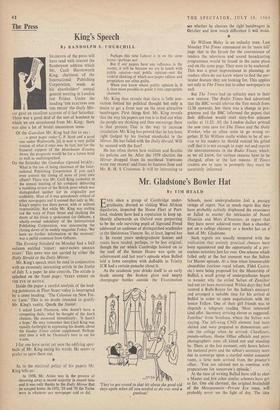The Press
King's Speech
By RANDOLPH S. CHURCHILL
STUDENTS of the press will have read with interest the flamboyant address which Mr. Cecil Harmsworth King, chairman of the International Publishing Corporation, made at his shareholders' annual general meeting in London last Friday. Under the heading 'THE ELECTION AND THE PRESS' the Daily Mir- ror gave an excellent account of it last Saturday. There was a good deal of the sort of bombast to which we are accustomed from Mr. King: there was also a lot of brutal uncommon sense.
Of the Guardian Mr. King had this to say : ... a great paper under C. P. Scott and a good one under Wadsworth, [it] is now a very pallid version of what it once was. In fact, but for the financial support of the Manchester Evening News, the prognosis would be for a future brief as well as undistinguished.
On the Saturday the Guardian riposted briskly : What is the use of being chairman of the Inter- national Publishing Corporation if you can't even control the timing of news of your own affairs? There was Mr. Cecil King yesterday at the annual meeting of his company delivering a rambling review of the British press which was distinguished neither for its originality nor audibility. Most of it was querulously critical of other newspapers and it seemed that only in Mr. King's empire was there power, with or without responsibility. But while Mr. King was sorting out the ways of• Fleet Street and chalking the doors of his rivals a spokesman for Odhams, a wholly-owned subsidiary of the International Publishing Corporation, was announcing the closing down of its weekly magazine Today. 'We have no further information at the moment,' was a pallid comment from Odhams.
The Evening Standard on Monday had a half column entitled 'TODAY: SHUT-DOWN SHOCKS STAFF.' This news was not carried by either the Daily Herald or the Daily Mirror. Mr. King's speech must be read in conjunction with an extremely interesting article in the Statist of July 3, a paper he also controls. The article is splashed On the front page: 'FLEET STREET ON THE EVE OF BATTLE: Inside the paper a careful analysis of the lead- ing potentates in Fleet Street today is interrupted by a cross heading: The Colossus on New Fet- ter Lane.' This is no doubt intended to gratify Mr. King's vanity. Quoth the Statist: I asked Lord Thomson, who doesn't have a competing daily, what he thought of the Sun's chances. He answered immediately: 'It hasn't a hope.' He may remember that Cecil King was equally forthright in expressing his doubts about the Sunday Times colour supplement. Perhaps next time it will be Thomson's turn to eat his words.
I for one have never yet seen the edifying spec- tacle of Mr. King eating his words. He seems to prefer to spew them out.
As to the electoral policy of his papers Mr. King tells us: In 1950, Mr. Attlee was in the process of throwing away a record majority in record time and it was only thanks to the Daily Mirror that he scraped home. In 1951, '55 and '59 the Tories were in whatever any newspaper said or did.
Perhaps this time Labour is in on the same terms—perhaps not.
But if our papers have any influence in the matter, it will be because we are in touch with public opinion—real public opinion—not the wishful thinking of which newspaper editors and proprietors are often guilty.
' When you know where public opinion is, it is then more possible to guide it into appropriate channels.
Mr. King thus reveals that there is little con- viction behind his political thought but only a desire to get a front seat on the most attractive bandwagon. First things first. Mr. King reveals that the way his papers are run is to find out what the people are thinking and then encourage them in that process. That is the way to increase circulation. Mr. King has proved that he has been right (judged by his limited standards) in the Mirror. He has failed with the Daily Herald. Will he succeed with the Sun?
He has often shown how resilient and flexible his policies can be. After the 1959 election the Mirror dropped from its masthead 'FORWARD WITH THE PEOPLE' and from its features Jane and Mr. R. H. S. Crossman. It will be interesting to
see whether he chooses the right bandwagon in October and how much difference it will make.
Sir William Haley is an unlucky man. Last Monday The Times announced on its 'main bill' page that in the future for the convenience of readers the television and sound broadcasting programmes would be found in the same place and on the same page. They were to be anchored. This was a great improvement in planning, as readers often do not knoW where to find the par- ticular feature they are looking for. This applies not only to The Times but to other newspapers as well.
But The Times had an unlucky start to their new venture. The Radio Times had advertised that the BBC would televise the Test match from 12.30 onwards; but there was a change in pro- gramme and the BBC informed the papers that their diffusion would start sixty-five minutes earlier at 11.25. All the London dailies printed the new time save for The Times and the Daily Worker, who so often seem to go wrong to- gether. If Sir William really wishes to be of ser- vice to his readers he should remind his gifted staff that it is not enough to copy out and reprint the announcements in the Radio Times, which, as we all know, for various reasons have to be changed, often at the last minute. If Times readers are to tune in promptly they must be accurately informed.










































 Previous page
Previous page